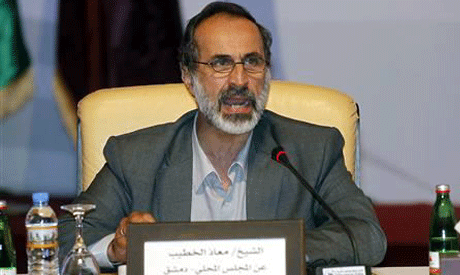
Moaz al-Khatib speaks to General Assembly of Syrian National Council in Doha November, 2012 (Photo: Reuters)
Syrian opposition chief Ahmed Moaz al-Khatib's offer of talks with regime officials is significant but "two years late".
"Despite their importance, the statements of Sheikh Moaz al-Khatib are two years late. During that time, our finest young men have died, suffered wounds or been exiled, while we have lost our electricity and fuel infrastructure, alongside several military positions," the pro-regime daily Al-Watan said in a long editorial on Tuesday.
"Two years have gone by, in which we have lost a lot because of the opposition's stubbornness and their refusal to negotiate," said the daily. "So the ball is not in the Syrian state's hands, as Khatib said" on Monday, in an interview with pan-Arab Al-Jazeera television, Al-Watan added.
The editorial was the first indication of official thinking as regards to Khatib's surprise proposal of negotiations as a way out of the conflict that has ravaged Syria for almost two years. Khatib, who heads the opposition Syrian National Coalition, said he was ready to talk with regime officials if "160,000 detainees" are released and if exiled Syrians are able to renew their passports abroad.
In the past the opposition has demanded Assad step down before talks can begin but analysts say Khatib's change in stance stems from a belief that the population will be bled dry while the West fails to act.
Formed in Doha, Qatar in November last year, the coalition is recognised by scores of states and international organisations as the sole legitimate representative of the Syrian people. "Khatib's declarations are insufficient. They do not make him an acceptable negotiator at a popular level," said Al-Watan, suggesting the opposition chief was insincere in his offer.
Khatib's statements "are a political manoeuvre, through which he is trying to correct his mistake of supporting the (jihadist) Al-Nusra Front," said Al-Watan. The editorial said Khatib "should explain the reasons behind his (alleged) support for Al-Nusra Front and for terrorism in general".
Since a revolt erupted against President Bashar al-Assad in March 2011, the regime has described dissidents and rebels alike as "terrorists". More recently, the regime has described all rebels as members of Al-Nusra Front, which is listed by the United States as a "terrorist" organisation.
Short link: